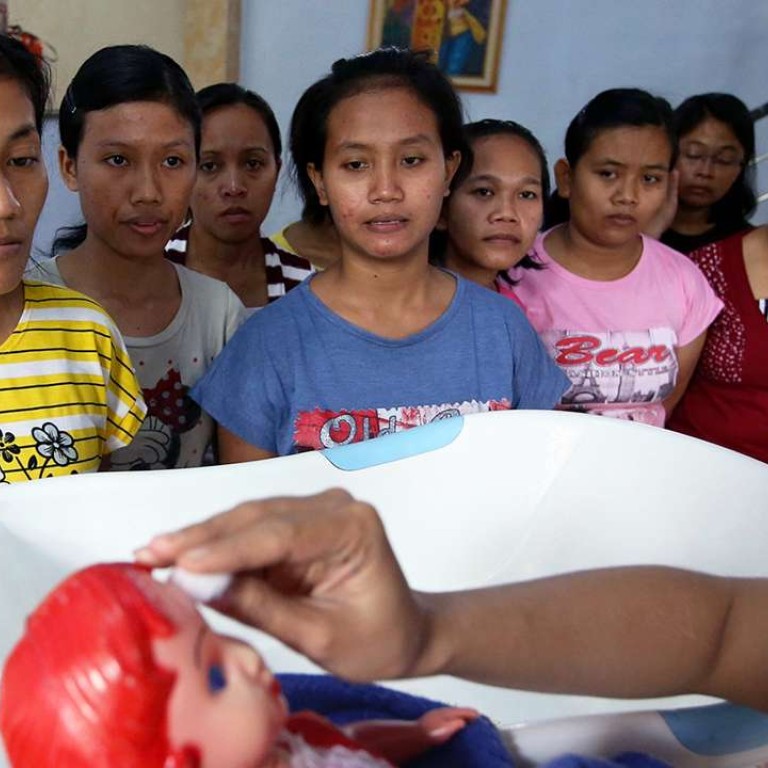
A toothless tiger? Advocates of domestic helpers’ rights in Hong Kong say new draft code of practice lacks enforcement mechanisms
Some say document also fails to tackle issues such as local employment agencies’ partnership with overseas counterparts
Cleaning up bad practices needs more than just sweeping statements on paper, advocates of domestic helpers’ rights are finding out.
When the Labour Department recently issued a 100-page draft code of practice to regulate the city’s 1,400 employment agencies for domestic workers, advocates new to the industry could be forgiven if they had hugged each other declaring that all the years of advocacy had not ended in vain.
A closer look would have revealed, however, that much of it contained mere reminders of how existing Hong Kong laws regulate the employment industry. While the draft does set out a list of some new standards the agencies need to comply with, advocates doubt its effectiveness, saying the code lacks enforcement and punishment mechanisms.
Disgruntled advocates also said the code fails to tackle the local agencies’ partnership with their overseas counterparts. They pointed out that the financial abuses the workers suffer begin before they leave their home countries for Hong Kong.

“It doesn’t say anything. There is no enforcement mechanism. There is also no punishment for non-compliance,” said David Bishop, co-founder of the not-for-profit Fair Employment Agency. “I believe the Hong Kong government has missed a great opportunity to help both employers and domestic workers by regulating the employment agency industry more closely.”
Hong Kong is home to about 340,000 foreign domestic workers. About half of them are from the Philippines and the other half, Indonesia.
The city’s laws allow agencies to charge domestic workers only 10 per cent of their first month’s salaries. As the minimum wage for them is now HK$4,210, the agencies can charge only HK$421.
But for years, unionists have lamented that almost every maid who comes to Hong Kong pays the agencies well above that limit, with many forking out up to HK$13,000.
They have also complained that the agencies were reluctant to help the workers when they were financially or physically abused, often citing the horrific case of Indonesian domestic worker Erwiana Sulistyaningsih.
Before she left Hong Kong in January 2014, Erwiana was physically abused for eight dark months, including having a metal tube from a vacuum cleaner shoved into her mouth. She has never been paid her wages.
Fast-forward to April 15, the Labour Department promulgated a code of practice for employment agencies for public consultation, which will last until 17 June.
The code is not a toothless tiger. Under the Employment Ordinance, the Commissioner for Labour has the power not to grant a licence, revoke a licence or refuse a renewal if the commissioner feels that it is not suitable for any operators to run an agency.
While the code is not legally-binding, Assistant Commissioner for Labour Queenie Wong Ting-chi argued this does not mean there are no punishment and enforcement mechanisms.
She said the code states clearly that if the agencies fail to comply with the new standards set out by the department, the Commissioner for Labour has the power under existing laws to revoke their licenses.
“The code is not a toothless tiger,” Wong said. “Under the Employment Ordinance, the Commissioner for Labour has the power not to grant a licence, revoke a licence or refuse a renewal if the commissioner feels that it is not suitable for any operators to run an agency.”
With the code coming into practice, the commissioner will consider how well the agencies have adhered to the new requirements before making licensing decisions.
The code requires agencies to draw up separate service agreements with domestic workers and employers. They must clearly list the service terms and the fees an agency will charge.
The consultation document includes seven types of sample documents the department has tailor made, including service agreements and receipts the agencies need to sign with both employers and domestic workers.
It also includes sample employment contracts in Chinese, English, Tagalog, Bahasa Indonesia and Thai so the workers can easily understand them. That is because the department requires the agencies to distribute the sample employment contracts to the domestic helpers, who then need to confirm in writing that the agencies have briefed them about contract details.
Another requirement is that agencies need to brief workers on their labour rights and how they can seek assistance from the government if necessary.

The code also demands that the agencies display posters and guidebooks produced by the department at the agencies’ offices. The employers also have to be provided with those materials.
Wong said that when the labour officers carry out inspections at the agencies, they will check if the agencies have given receipts and service agreements to both the employers and workers.
“If we can’t find [the documents], will the agencies have their licences revoked at the first time? Not necessarily. But if they still refuse to do so after we have told them about it, and have issued warnings to them, then the commissioner can exercise his power,” she said.
Wong added that the decisions will be made on a case-by-case basis depending on severity.
She also said the government started preparing the code in mid-2014. The decision was made to issue a code instead of making it legislation because it could come into practice much faster this way.
Secretary for Labour and Welfare Matthew Cheung Kin-chung said that he aimed to legislate the code two years after it came into practice if it turned out to be ineffective.
Under current law, if an agency is found to have overcharged a worker, the maximum fine is just HK$50,000.
Wong stressed that the government was open to hearing all opinions during the consultation. That included beefing up the fine and adding an imprisonment clause.
Despite his criticism of the code, Bishop said the government was at least moving in the right direction by thinking about the issue in an open manner.
“While I was frustrated by some aspects of the code of practice, I am very hopeful that Hong Kong will continue to improve in terms of working conditions for foreign domestic workers,” said Bishop, who is also principal lecturer at the University of Hong Kong’s faculty of business and economics.
While I was frustrated by some aspects of the code of practice, I am very hopeful that Hong Kong will continue to improve in terms of working conditions for foreign domestic workers.
Bishop co-founded his not-for-profit agency more than a year ago with the mission that more business leaders would follow his model so that his agency would not need to exist in 10 years because no more workers would be abused by the agencies by then.
Teresa Liu Tsui-lan, managing director of Technic Employment Service Centre, was more optimistic about the code’s effectiveness.
“It’s a good thing that the sample agreements from the Labour Department contain so many details. All parties will be clear about all the service terms. There are discrepancies in service quality among the agencies in Hong Kong. The code should help make improvements,” the boss of one of the city’s biggest agencies said. “It should be able to help improve the industry’s image.”
But she was not fond of the idea that the code would become law if it proved to be ineffective otherwise.
“Legislating it or not doesn’t matter to me, because I have abided by all the rules. But it’s just not a good feeling that my agency, as a rule-abiding one, suddenly needs to come under the new laws,” she said.

The Mission for Migrant Workers, a non-governmental organisation that helps domestic workers, said that 4,598 workers sought help from it last year, up almost 10 per cent from 4,197 in 2014.
I am very disappointed that the best the government could come up with is a code. There are already existing laws that regulate the agencies and the agencies are violating them.
Among those who asked the organisation for help, 41 per cent complained about their agencies – many about overcharging of placement fees.
Eman Villanueva, spokesman for the Asia Migrants’ Coordinating Body, said: “Placement fee overcharging is very common. The worst part is that the workers are made to believe the fees are for other purposes, such as training and even internet.
“The code of practice is long overdue. I am very disappointed that the best the government could come up with is a code. There are already existing laws that regulate the agencies, and the agencies are violating them. I don’t see how this code will help.”
The Philippine government has a “no placement fee” policy in place but, Villanueva said, many agencies in the country are flouting it. Given the rampant nature of the overcharging, he described it as “organised crime”.
University of Hong Kong’s associate professor of law Puja Kapai agreed that many abuses the workers suffered took place before they arrived in Hong Kong, and the code of practice had disappointingly failed to address that.
“Hong Kong is a global city. The government is very well-equipped to tackle the problem like we tackle transnational crimes.” she said.
She suggested that the government track down the overseas partners of local agencies to see if the partners had been involved in malpractice. If so, the local agencies should not be allowed to work with them, she added.
“This is human trafficking. And Hong Kong does not have anti-human-trafficking laws for the purpose of labour exploitation.”
She was also disappointed the code did not attempt to tackle the two controversial policies that require domestic workers in Hong Kong to live with their employers and return to their home countries two weeks after their contracts are terminated.
Despite all the criticism, the Labour Department’s Wong is confident that the code will work.
“We are confident. The code will be setting new standards for the industry. At the moment, we do not require the industry to have standardised service agreements and receipts. But under the code, they will have to do so,” she said.
At a glance
• A service agreement for the domestic workers, and another for the employers, needs to be drawn up.
• The agreement with the workers should include the amount of commission to be charged, when they need to pay the commission, the workers’ employment history in the past two years, etc.
• The agreement with the employers needs to list details of the fees to be charged, payment schedule to the agency, whether a refund is available if the agency’s service is not delivered in full and the resume of the selected worker.
• Agencies need to provide receipts for any payments received from the workers and employers.
• Workers should be told by the agencies where they can seek assistance from the government if they run into trouble. The agencies should also provide the workers with a copy of the Labour Department’s sample service employment contracts in their mother language. The workers then need to confirm in writing that they have received the sample copy.
• The employers have to be briefed by the agencies about their obligations under the Employment Ordinance, Immigration Ordinance and the department’s sample employment contract.
• The department’s publicity materials about labour rights, such as posters and guidebooks, should be put in the agency’s office.

